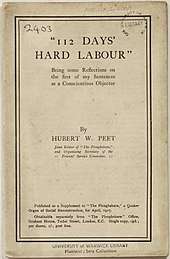Stephen Peet
Stephen Hubert Peet (16 February 1920 – 22 December 2005) was a British filmmaker, best known as a pioneer of illustrated oral history and his BBC television series Yesterday's Witness (1969–1981).
Parental family and early life

Stephen Hubert Peet was born on 16 February 1920, in Penge, South London, the youngest child of Hubert William Peet (1886 - 1951) and his wife, Edith Mary, born Scott. He had two older sisters and an older brother, John.
Stephen's parents were Quakers, unlike his four grandparents who were Congregationalist. His mother's parents had served as missionaries.[1]
Stephen's father was a journalist, who wrote religious news and also edited the weekly Quaker magazine The Friend from 1932 to 1949. He was also an absolutist conscientious objector, who suffered three terms of imprisonment for his refusal to obey military orders.[2][3][4]
Peet was educated at the Quaker Sidcot School, Somerset,[5] where he met first his future wife, Olive, as a younger fellow pupil [6] (they married in July 1948 )[7]).
Second World war
He was, like his father, a conscientious objector in World War II, serving with the Friends Ambulance Unit in London, north Africa and Greece, where he was taken prisoner on Kos, to become a civilian internee in Austria, then Germany. Following release after the war he began film work for the FAU, and then, with a former FAU colleague, Maurice Broomfield, for International Student Service
Film career
He had begun his career in the late 1930s as a camera assistant in the documentary unit run by Marian Grierson, sister of John Grierson. He worked in the Central Africa Film Unit for seven years, making narrative educational films for village audiences, before work at ITV and the BBC.[8][9] Unknown until 1985, MI5 blocked Peet's career progression at the BBC in 1965, suspicious of him for retaining links with his older brother, John, a communist who defected to East Germany in 1950.[10][11]
With Yesterday's Witness, Peet pioneered having ordinary members of the public telling their stories straight to the camera. He worked with others on the series, including James Cameron. The BBC Two series in included a programme - "Prisoners of conscience: No to the State", no doubt a subject close to Stephen Peet's heart.[12][13]
Personal life
Stephen and Olive Peet had two sons, Graham and John, and twins, a boy and a girl, Michael and Susie.
References
- Imperial War Museum interview with Stephen Peet on 30 October 1990. Catalogue No. 11736. Recorder: Lyn E Smith. Ten reels of audiotape (available online) with online text summary.
- Biography of H. W. Peet, John Peet's father, on London Borough of Lewisham's First Work War website
- The Times, 29 August 1917,Pg 3, Issue 41569: "News in Brief" - H W Peet's third prison sentence.
- Obituary in The Times 6 January 1951, Pg 8, Issue 51892
- Sidcot School: Interesting old scholars: Stephen Peet 1933 - 1938.
- Olive's father was Arthur Newbery, according to Commemorative programme of 2014 International Conscientious Objectors Day pg 21
- Camden Review 21 July 2011: Olive Peet's recollections of the 1948 Olympics, which started a few days after her marriage.
- Filmography of Stephen Peet by the British Film Institute
- Documentary filmmaker to give master class at UNT (University of North Texas) Friday, April 9, 1999
- David Leigh and Paul Lashmar "The Blacklist in Room 105", The Observer, 18 August 1985, p.9; Mark Hollingsworth and Richard Norton-Taylor Blacklist: The Inside Story of Political Vetting, London: Hogarth, 1988, p.103. The relevant extract from the book is here
- The long engagement autobiography of John Peet. Fourth Estate, October 1989 ISBN 0947795642
- "Prisoners of conscience: No to the State" (Yesterday's witness series) produced by Stephen Peet and broadcast 26 May 1969 on BBC Two.
- A book of the series was published by BBC Books; 1st edition in April 1979. ISBN 0563171855
Sources
- Obituary in The Guardian: Stephen Peet: Filmmaker behind Yesterday's Witness by Steve Humphries, 17 February 2006
- Letter from Alan Dein: Stephen Peet's contribution to the oral history community in the UK, Guardian 22 March 2006
- Short biography
- Imperial War Museum interview with Stephen Peet by Lyn E Smith (Recorder) Catalogue number 11736, Production date 1990-10-30, ten reels of audio tape with text summary, available online
See also
- A Far Cry (1959 film), directed by Stephen Peet